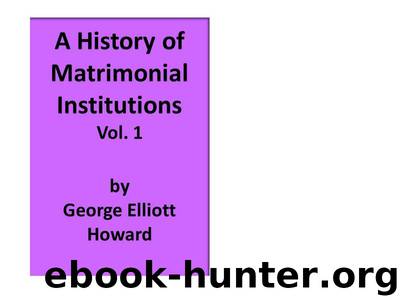A History of Matrimonial Institutions, Volume 1 (of 3) by George Elliott Howard

Author:George Elliott Howard [Howard, George Elliott]
Language: eng
Format: epub
Published: 2015-06-01T16:00:00+00:00
But adding to the powers of the "Ecclesiastical Star Chamber" would scarcely be regarded by the Puritans as even a satisfactory palliation for such a grievance. The policy of the Stuarts tended swiftly to mold their opinions into organized resistance; and the marriage question became at last one of the cardinal issues in the reform program. Thus in the "Millenary Petition" of 1603 the Puritan ministers, while objecting to the "cross in baptism," the "cap and surplice," profanation of the Lord's day, "double-beneficed men," "popish opinions," and "longsomeness of service," pray also for the reversal of "divers popish canons," such "as the restraint of marriage at certain times;" for greater caution in granting "licenses for marriage without banns;" and for the correction of "divers terms of priests and absolution and some other used, with the ring in marriage, and other such like in the book."[1295] On the other hand, if the Puritan loathed the so-called "popish" tendencies of the established church, as these became more and more pronounced under the rule of Laud, both the Puritan and the Anglican united in merciless persecution of the adherents of Rome. The act of 1606, "to prevent and avoid dangers which may grow by Popish recusants," is one of the most barbarous of those which for ages disgraced the English statute book. By this law a "popish recusant convict," or a man whose wife alone is convicted of recusancy, is forbidden to "exercise any public office in the commonwealth," except "such husband himself and his children ... above the age of nine years abiding with him and his servants in household shall once every month at the least, not having any reasonable excuse to the contrary, repair to some church or chapel" of the establishment and "there hear divine service;" and unless, with his children and servants of meet age, he receives the sacrament of the Lord's Supper when required by law, and "bring up his children in the true religion." Every married woman convicted of recusancy, her husband not being so convicted, who shall not "conform herself ... by the space of one whole year next before the death of her said husband, shall forfeit to the King's Majesty ... the issues and profits of two parts of her jointure and two parts of her dower, ... and also be disabled to be executrix or administratrix" of her husband, "and to have ... any part of his goods and chattels." Any child[1296] sent abroad without the king's license, to prevent his "good education in England or for any other cause," may have "no benefit by any gift, conveyance, descent, devise or otherwise of any lands ... goods or chattels," until he reach the age of eighteen or more, when, as a condition of recovering his property, he must take an iron-clad oath of allegiance[1297] and partake of the sacrament. In the meantime—and here a broad way was opened up for fraud and wickedness—all the rights mentioned are to pass to the "next of kin which shall be no Popish recusant.
Download
This site does not store any files on its server. We only index and link to content provided by other sites. Please contact the content providers to delete copyright contents if any and email us, we'll remove relevant links or contents immediately.
Nudge - Improving Decisions about Health, Wealth, and Happiness by Thaler Sunstein(7678)
The Fire Next Time by James Baldwin(5409)
iGen by Jean M. Twenge(5398)
Adulting by Kelly Williams Brown(4552)
The Sports Rules Book by Human Kinetics(4367)
The Hacking of the American Mind by Robert H. Lustig(4355)
The Ethical Slut by Janet W. Hardy(4232)
Captivate by Vanessa Van Edwards(3828)
Mummy Knew by Lisa James(3670)
In a Sunburned Country by Bill Bryson(3524)
The Worm at the Core by Sheldon Solomon(3468)
Ants Among Elephants by Sujatha Gidla(3450)
The 48 laws of power by Robert Greene & Joost Elffers(3203)
Suicide: A Study in Sociology by Emile Durkheim(3002)
The Slow Fix: Solve Problems, Work Smarter, and Live Better In a World Addicted to Speed by Carl Honore(2990)
The Tipping Point by Malcolm Gladwell(2896)
Humans of New York by Brandon Stanton(2860)
Handbook of Forensic Sociology and Psychology by Stephen J. Morewitz & Mark L. Goldstein(2689)
The Happy Hooker by Xaviera Hollander(2678)
